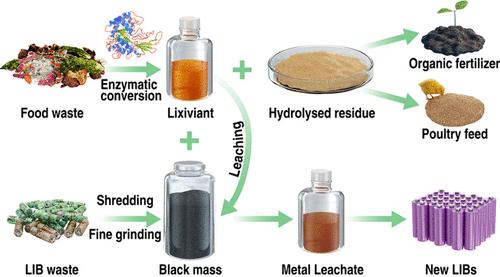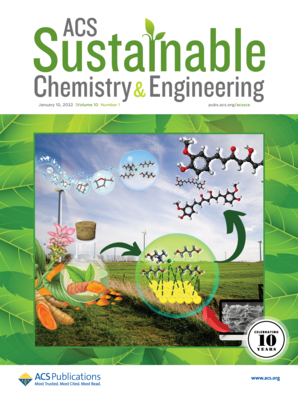Metal Extraction from Commercial Black Mass of Spent Lithium-Ion Batteries Using Food-Waste-Derived Lixiviants through a Biological Process
IF 7.1
1区 化学
Q1 CHEMISTRY, MULTIDISCIPLINARY
引用次数: 0
Abstract
Lithium-ion batteries (LIBs) power most electronic devices, electric vehicles (EVs), and energy storage devices, and LIB waste is the most critical global problem in electronic waste management. However, recovering and reusing metals from discarded LIBs can reduce environmental risks and provide valuable sources of metal for new batteries. Food waste is a global issue. Most food leftovers are discarded in landfills or incinerated, with a recycling rate of approximately 10–20%. Utilizing food waste to treat LIB waste is an innovative approach that can effectively reduce waste and promote a circular economy, leading to sustainable expansion. In this innovative and environmentally friendly study, we utilize a biocatalytic procedure to transform food waste into lixiviants and extract valuable metals such as Ni, Mn, Co, and Li from spent LIBs. This study also demonstrates that gluconic acid is the primary acid produced through the enzymatic conversion of food waste into lixiviants, a sustainable process that selectively forms metal chelates with valuable LIB metals. The food-waste-derived lixiviants could extract valuable metals from LCO- and NMC-based industrial black masses at a solid content of 50 g/L with a leaching efficiency of 80–99% confirmed by inductively coupled plasma optical emission spectrometry (ICP-OES). The X-ray diffraction, scanning electron microscopy, and ICP-OES studies of LIB black masses and their leaching residues have verified that nearly all metals have been extracted from the LIB black mass. This environmentally conscious approach can efficiently extract metals from exhausted EV batteries in the interest of sustainability.

通过生物工艺,利用从食物垃圾中提取的立克次活化剂从商用废旧锂离子电池黑块中提取金属
锂离子电池(LIB)为大多数电子设备、电动汽车(EV)和储能设备提供动力,而锂离子电池废弃物是全球电子废弃物管理中最严重的问题。然而,从废弃的锂离子电池中回收和再利用金属可以降低环境风险,并为新电池提供宝贵的金属来源。食物浪费是一个全球性问题。大多数剩菜剩饭被丢弃在垃圾填埋场或焚烧,回收率约为 10-20%。利用食物垃圾处理枸杞废弃物是一种创新方法,可有效减少浪费,促进循环经济,实现可持续发展。在这项创新且环保的研究中,我们利用生物催化程序将食物垃圾转化为lixiviants,并从废锂电池中提取出有价值的金属,如镍、锰、钴和锂。这项研究还证明,葡萄糖酸是通过酶法将食物垃圾转化为lixiviants产生的主要酸性物质,这种可持续的工艺可选择性地与有价值的锂电池金属形成金属螯合物。经电感耦合等离子体光发射光谱法(ICP-OES)证实,从食物垃圾中提取的螯合剂可从固体含量为 50 克/升的基于 LCO 和 NMC 的工业黑块中提取有价金属,浸出效率为 80-99%。对锂电池黑块及其浸出残留物进行的 X 射线衍射、扫描电子显微镜和 ICP-OES 研究证实,几乎所有金属都已从锂电池黑块中提取出来。这种具有环保意识的方法可以有效地从耗尽的电动汽车电池中提取金属,从而实现可持续发展。
本文章由计算机程序翻译,如有差异,请以英文原文为准。
求助全文
约1分钟内获得全文
求助全文
来源期刊

ACS Sustainable Chemistry & Engineering
CHEMISTRY, MULTIDISCIPLINARY-ENGINEERING, CHEMICAL
CiteScore
13.80
自引率
4.80%
发文量
1470
审稿时长
1.7 months
期刊介绍:
ACS Sustainable Chemistry & Engineering is a prestigious weekly peer-reviewed scientific journal published by the American Chemical Society. Dedicated to advancing the principles of green chemistry and green engineering, it covers a wide array of research topics including green chemistry, green engineering, biomass, alternative energy, and life cycle assessment.
The journal welcomes submissions in various formats, including Letters, Articles, Features, and Perspectives (Reviews), that address the challenges of sustainability in the chemical enterprise and contribute to the advancement of sustainable practices. Join us in shaping the future of sustainable chemistry and engineering.
 求助内容:
求助内容: 应助结果提醒方式:
应助结果提醒方式:


